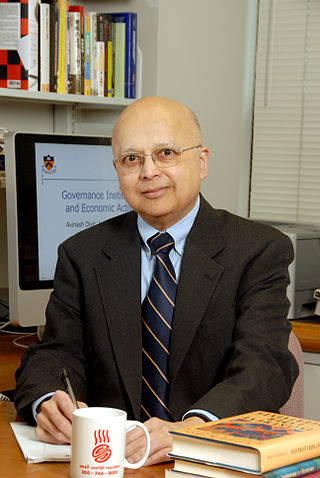
Ziauddin Sardar is a British-Pakistani scholar, award-winning writer, cultural critic and public intellectual who specialises in Muslim thought, the future of Islam, futurology and science and cultural relations. He wrote or edited more than 50 books Prospect magazine named him as one of Britain's top 100 public intellectuals and The Independent newspaper called him: 'Britain's own Muslim polymath'.

The Harvard Graduate School of Design (GSD) is the graduate school of design at Harvard University, a private research university in Cambridge, Massachusetts. It offers master's and doctoral programs in architecture, landscape architecture, urban planning, urban design, real estate, design engineering, and design studies.

Avinash Kamalakar Dixit is an Indian-American economist. He is the John J. F. Sherrerd '52 University Professor of Economics Emeritus at Princeton University, and has been Distinguished Adjunct Professor of Economics at Lingnan University, senior research fellow at Nuffield College, Oxford and Sanjaya Lall Senior Visiting Research Fellow at Green Templeton College, Oxford.
Lowery Stokes Sims is an American art historian and curator of modern and contemporary art known for her expertise in the work of African, African American, Latinx, Native and Asian American artists such as Wifredo Lam, Fritz Scholder, Romare Bearden, Joyce J. Scott and others. She served on the curatorial staff of the Metropolitan Museum of Art, the Studio Museum in Harlem, and the Museum of Arts and Design. She has frequently served as a guest curator, lectured internationally and published extensively, and has received many public appointments. Sims was featured in the 2010 documentary film !Women Art Revolution.

Kenneth George "Ken" Binmore, is an English mathematician, economist, and game theorist, a Professor Emeritus of Economics at University College London (UCL) and a Visiting Emeritus Professor of Economics at the University of Bristol. As a founder of modern economic theory of bargaining, he made important contributions to the foundations of game theory, experimental economics, evolutionary game theory and analytical philosophy. He took up economics after holding the Chair of Mathematics at the London School of Economics. The switch has put him at the forefront of developments in game theory. His other interests include political and moral philosophy, decision theory, and statistics. He has written over 100 scholarly papers and 14 books.
Neil Leach is a British architect and theorist. He is also a licensed architect, registered to practice in the United Kingdom.
Yew-Kwang Ng is a Malaysian-Australian economist, who is currently Special Chair Professor of Economics at Fudan University, Shanghai, and a Distinguished Fellow of the Academy of the Social Sciences in Australia. He has published in a variety of academic disciplines and is best known for his work in welfare economics.
The International Futures Forum (IFF) is an educational charity registered in Scotland that address complex, messy issues to enable people to thrive in the 21st century. It is funded through philanthropic grants, donations, the sale of its books, products, training and learning programmes.
Philosophy of design is the study of definitions of design, and the assumptions, foundations, and implications of design. The field, which is mostly a sub-discipline of aesthetics, is defined by an interest in a set of problems, or an interest in central or foundational concerns in design. In addition to these central problems for design as a whole, many philosophers of design consider these problems as they apply to particular disciplines.
Jussi Ville Tuomas Parikka is a Finnish new media theorist and Professor in Digital Aesthetics and Culture at Aarhus University, Denmark. He is also (visiting) Professor in Technological Culture & Aesthetics at Winchester School of Art as well as visiting professor at FAMU at the Academy of Performing Arts in Prague. In Finland, he is Docent of digital culture theory at the University of Turku. Until May 2011 Parikka was the Director of the Cultures of the Digital Economy (CoDE) research institute at Anglia Ruskin University and the founding Co-Director of the Anglia Research Centre for Digital Culture. With Ryan Bishop, he also founded the Archaeologies of Media and Technology research unit.

Steffen Lehmann is a German-born architect and urban designer.

James Clifford is an interdisciplinary scholar whose work combines perspectives from history, literature, history of science, and anthropology.
Tony Bennett is a British sociologist who has held academic positions in the United Kingdom and Australia. His work focusses on cultural studies and cultural history.

Alexander Laszlo (*1964) is a polycultural systems scientist, currently residing in Argentina.

Adrian Lisa Parr Zaretsky is an Australian-born philosopher and cultural critic, and dean of the College of Design at the University of Oregon, United States. She specializes in environmental philosophy and activism. In addition, she published on the sustainability movement, climate change politics, activist culture, and creative practice.

Design studies can refer to any design-oriented studies but is more formally an academic discipline or field of study that pursues, through both theoretical and practical modes of inquiry, a critical understanding of design practice and its effects in society.








